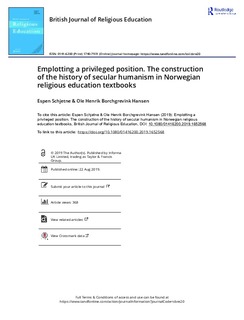Emplotting a privileged position. The construction of the history of secular humanism in Norwegian religious education textbooks
Journal article, Peer reviewed
Published version
Permanent lenke
http://hdl.handle.net/11250/2629914Utgivelsesdato
2019-08-22Metadata
Vis full innførselSamlinger
Sammendrag
There has recently been an increasing focus on the inclusion of non-religious world-views in religious education (RE). An important concern for the legitimacy of an RE subject in public education in liberal democracies is that all traditions, whether religious or secular, are treated in an equal and inclusive manner. This article examines the Norwegian case, where secular worldviews have been integrated as a central part of the compulsory national curriculum in RE for over 20 years. It does so by considering how the history of secular humanism is constructed in Norwegian RE textbooks. Theoretically, the article draws on the postmodern historiographic critique presented by Hayden White. A central concept is emplotment and the idea that emplotments convey moral arguments. Three narratives – ‘rationality’, ‘humanity’ and ‘rights and democracy’ – are identified as the core of the history of secular humanism being told in the material. The article suggests that the way these narratives are emplotted grants secular humanism a privileged position and that the fair and balanced representation of worldviews in RE education calls for alternative emplotments of this history.

